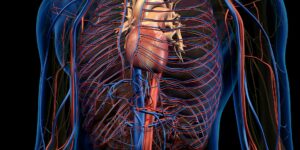
Some of us can recall images of darkened and damaged lungs when public health information about the harmful effects of smoking first began to circulate in the 1960s. Decades later, the first health risk many people still think about when it comes to smoking is lung cancer, although awareness has grown about the associations between smoking and other forms of cancer, or heart disease.
That said, many people still aren’t aware that smoking doesn’t just affect select parts of your body, like the lungs or the heart. In fact, smoking affects nearly every single system, organ, tissue, and cell in your body. This includes your entire vascular system, of which your arteries and veins play an essential role.
Arteries are blood vessels that carry oxygen-rich blood away from the heart to every part of your body, including your organs, muscles, tissues, and cells. Veins are the blood vessels that return that blood, now low in oxygen, from the body back to the heart for reoxygenation.
Blood Highways—Smooth Sailing Or Congested?
You can think of this complex system of your body’s blood vessels almost like highways that need to keep traffic—in this case blood carrying oxygen and nutrients—moving swiftly and without congestion. However, when you smoke, nicotine causes your blood vessels to constrict, which reduces the amount of blood that can flow to your organs. The highways become jammed.
Plus, over time the continual constriction from smoking makes your blood vessels more narrow and stiff. The organs, body tissues, and cells throughout your entire body receive much less oxygen and nutrients than they would if you didn’t smoke. Constricted blood vessels also make your heart beat faster and your blood pressure go up, and can contribute to clots forming in your arteries.
Any condition that results from a system of restricted blood vessels is considered vascular disease. Depending on the location, restrictions or blockages in the vascular system from smoking lead to a higher risk of diseases such as:
- Heart attacks
- Strokes
- Abdominal aortic aneurysms
- Peripheral artery disease (or PAD)
- Carotid artery disease (CAD)
In addition, smoking has been linked to nearly every form of cancer, including cancers of the blood, liver, stomach, pancreas, kidney, cervix, colon, bladder, esophagus, and, of course, the lungs. Smoking also affects fertility in men and women, healthy pregnancies, the health of your bones, teeth and eyes, and contributes to general inflammation and decreased immune function in your body.
Now For The Good News
If you or a loved one smokes, don’t assume that your health is doomed. The good news is that quitting smoking cuts your risk of vascular diseases and can increase your lifespan significantly. according to the Center For Disease Control (CDC),. Consider these statistics from the CDC:
- Within 2 to 5 years after quitting smoking, your risk for stroke may reduce to near that of a nonsmoker’s.
- Risks for cancers of the mouth, throat, esophagus, and bladder drop by 50% within 5 years after quitting smoking.
- Risk for dying from lung cancer drops by 50% after 10 years of quitting smoking.
- Risk for a heart attack drops sharply after 1 year of quitting smoking.
For most people, quitting smoking requires a researched plan and support system. (And please, don’t consider vaping as an alternative!) There are many support systems in your community or through your physician that are ready to help you stop smoking.
Here are just a few smoking cessation programs in the Evansville area:
- Free Nicotine Patch Program & Smoking Cessation Classes, Vanderburgh County Health Dept, 420 Mulberry St, Evansville. 812-435-5807.
- INDIANA TOBACCO QUITLINE: 1-800-QUIT-NOW (1-800-784-8669)
- Tri-Cap Health Services, 727 John St. Evansville. 812-428-5871
- Smoking Cessation Classes for Pregnancy. Vanderburgh County Health Dept, 420 Mulberry St. 812-435-5807.
Vascular Screenings
If you have smoked in the past, or still currently smoke, it’s also a smart idea to be screened for vascular disease. Ultrasonic screening is painless, quick, and easy, taking typically less than a half-hour.
Evansville Surgical Associates Vascular Screenings evaluate you for signs of:
- Carotid Artery Disease (CAD)
- Peripheral Arterial Disease (PAD)
- Abdominal Aortic Aneurysm (AAA)
Screenings are only $35.00 each, or $100.00 for all three. Medicare pays for one AAA screening for beneficiaries who are at risk.
Should any indications of vascular disease be detected, there are a number of non-surgical treatments that can reduce progression of the disease. These include medications to lower your cholesterol and blood pressure, establishing a healthy weight, and quitting smoking.
Evansville Surgical Associates’ Vascular Expertise
Evansville Surgical Associates specializes in the comprehensive treatment of vascular diseases—including preventative screenings, diagnosis, and life-saving treatments. Our registered vascular technologists have nearly 34 years of combined experience and are registered in vascular technology by the American Registry of Diagnostic Medical Sonographers (ARDMS).
Our five board-certified and fellowship-trained vascular surgeons through preventative care and minimally-invasive endovascular and traditional surgical techniques, including angioplasty and stenting of peripheral, carotid, and mesenteric arteries, open vascular procedures, and minimally-invasive endovascular repair of abdominal aortic aneurysms.
Established in 1969, Evansville Surgical Associates celebrates 50 years of providing leading-edge comprehensive and compassionate surgical care. Learn more about our physicians and our practices by visiting our website, or by calling us at 812.424.8231 or 800.264.8231.



